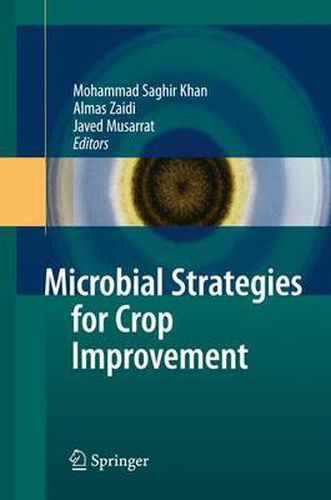Readings Newsletter
Become a Readings Member to make your shopping experience even easier.
Sign in or sign up for free!
You’re not far away from qualifying for FREE standard shipping within Australia
You’ve qualified for FREE standard shipping within Australia
The cart is loading…






This title is printed to order. This book may have been self-published. If so, we cannot guarantee the quality of the content. In the main most books will have gone through the editing process however some may not. We therefore suggest that you be aware of this before ordering this book. If in doubt check either the author or publisher’s details as we are unable to accept any returns unless they are faulty. Please contact us if you have any questions.
With an ever-increasing human population, the demand placed upon the agriculture sector to supply more food is one of the greatest challenges for the agrarian community. In order to meet this challenge, environmentally unfriendly agroch- icals have played a key role in the green revolution and are even today commonly recommended to circumvent nutrient de?ciencies of the soils. The use of ag- chemicals is, though, a major factor for improvement of plant production; it causes a profound deteriorating effect on soil health (soil fertility) and in turn negatively affects the productivity and sustainability of crops. Concern over disturbance to the microbial diversity and consequently soil fertility (as these microbes are involved in biogeochemical processes), as well as economic constraints, have prompted fun- mental and applied research to look for new agro-biotechnologies that can ensure competitive yields by providing suf?ciently not only essential nutrients to the plants but also help to protect the health of soils by mitigating the toxic effects of certain pollutants. In this regard, the role of naturally abundant yet functionally fully unexplored microorganisms such as biofertilizers assume a special signi?cance in the context of supplementing plant nutrients, cost and environmental impact under both conventional practices and derelict environments. Therefore, current devel- ments in sustainability involve a rational exploitation of soil microbial communities and the use of inexpensive, though less bio-available, sources of plant nutrients, which may be made available to plants by microbially-mediated processes.
$9.00 standard shipping within Australia
FREE standard shipping within Australia for orders over $100.00
Express & International shipping calculated at checkout
This title is printed to order. This book may have been self-published. If so, we cannot guarantee the quality of the content. In the main most books will have gone through the editing process however some may not. We therefore suggest that you be aware of this before ordering this book. If in doubt check either the author or publisher’s details as we are unable to accept any returns unless they are faulty. Please contact us if you have any questions.
With an ever-increasing human population, the demand placed upon the agriculture sector to supply more food is one of the greatest challenges for the agrarian community. In order to meet this challenge, environmentally unfriendly agroch- icals have played a key role in the green revolution and are even today commonly recommended to circumvent nutrient de?ciencies of the soils. The use of ag- chemicals is, though, a major factor for improvement of plant production; it causes a profound deteriorating effect on soil health (soil fertility) and in turn negatively affects the productivity and sustainability of crops. Concern over disturbance to the microbial diversity and consequently soil fertility (as these microbes are involved in biogeochemical processes), as well as economic constraints, have prompted fun- mental and applied research to look for new agro-biotechnologies that can ensure competitive yields by providing suf?ciently not only essential nutrients to the plants but also help to protect the health of soils by mitigating the toxic effects of certain pollutants. In this regard, the role of naturally abundant yet functionally fully unexplored microorganisms such as biofertilizers assume a special signi?cance in the context of supplementing plant nutrients, cost and environmental impact under both conventional practices and derelict environments. Therefore, current devel- ments in sustainability involve a rational exploitation of soil microbial communities and the use of inexpensive, though less bio-available, sources of plant nutrients, which may be made available to plants by microbially-mediated processes.